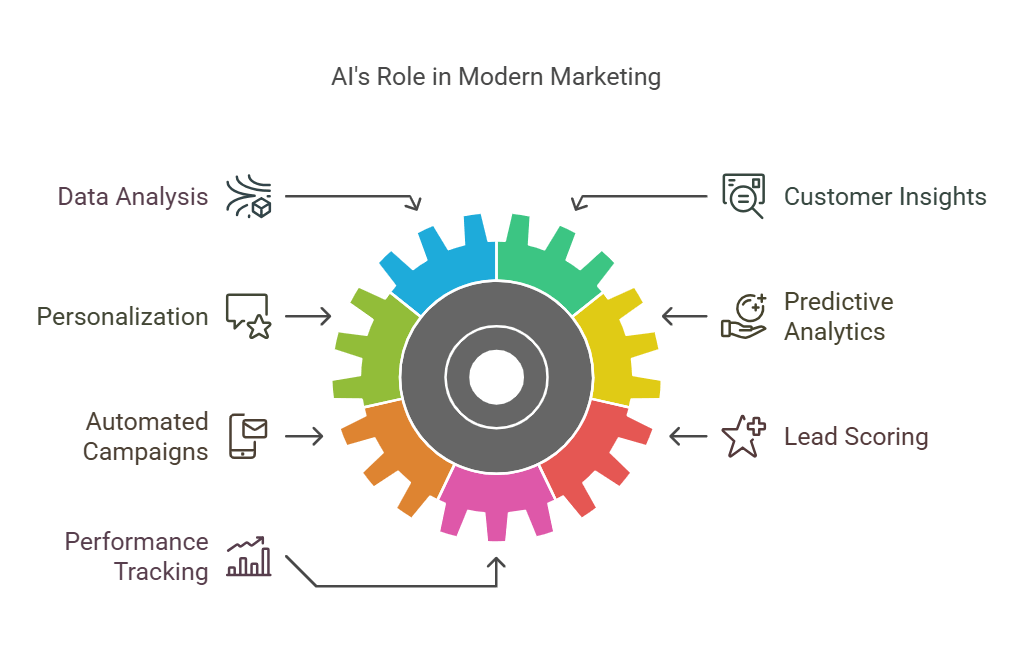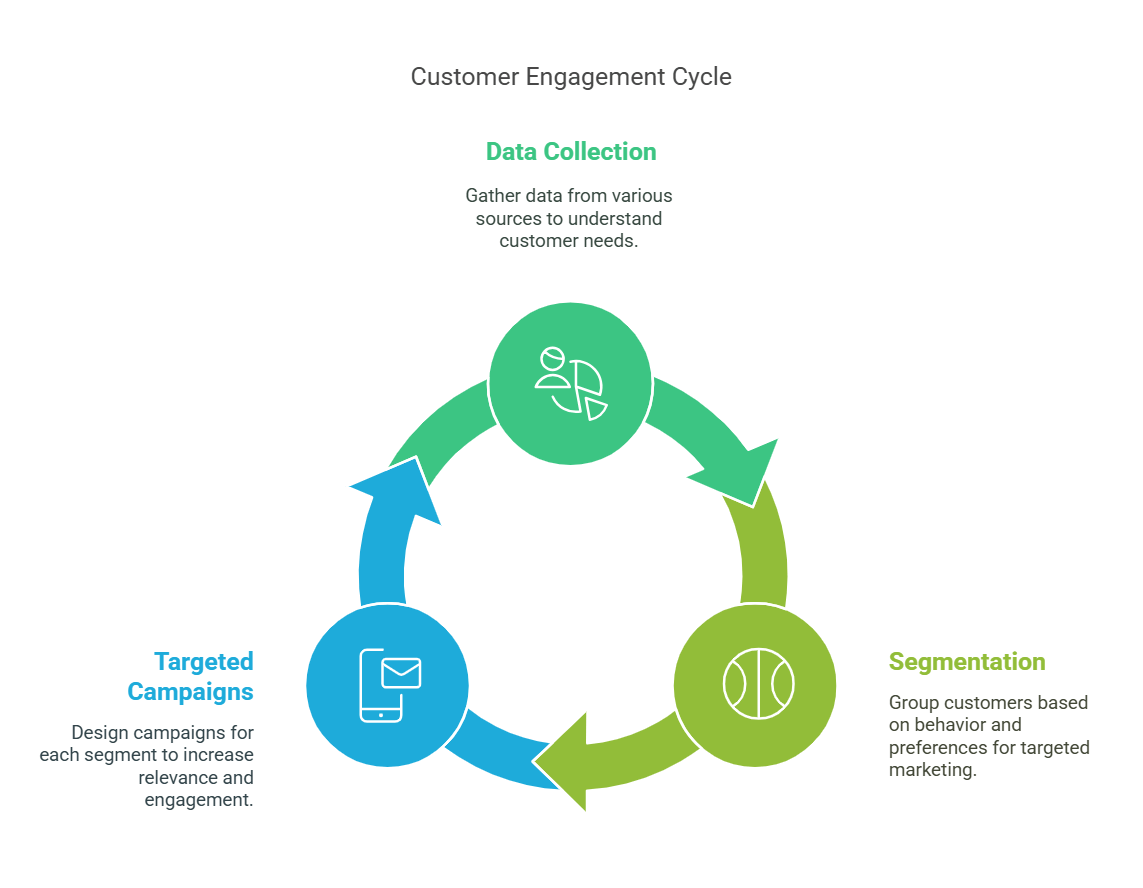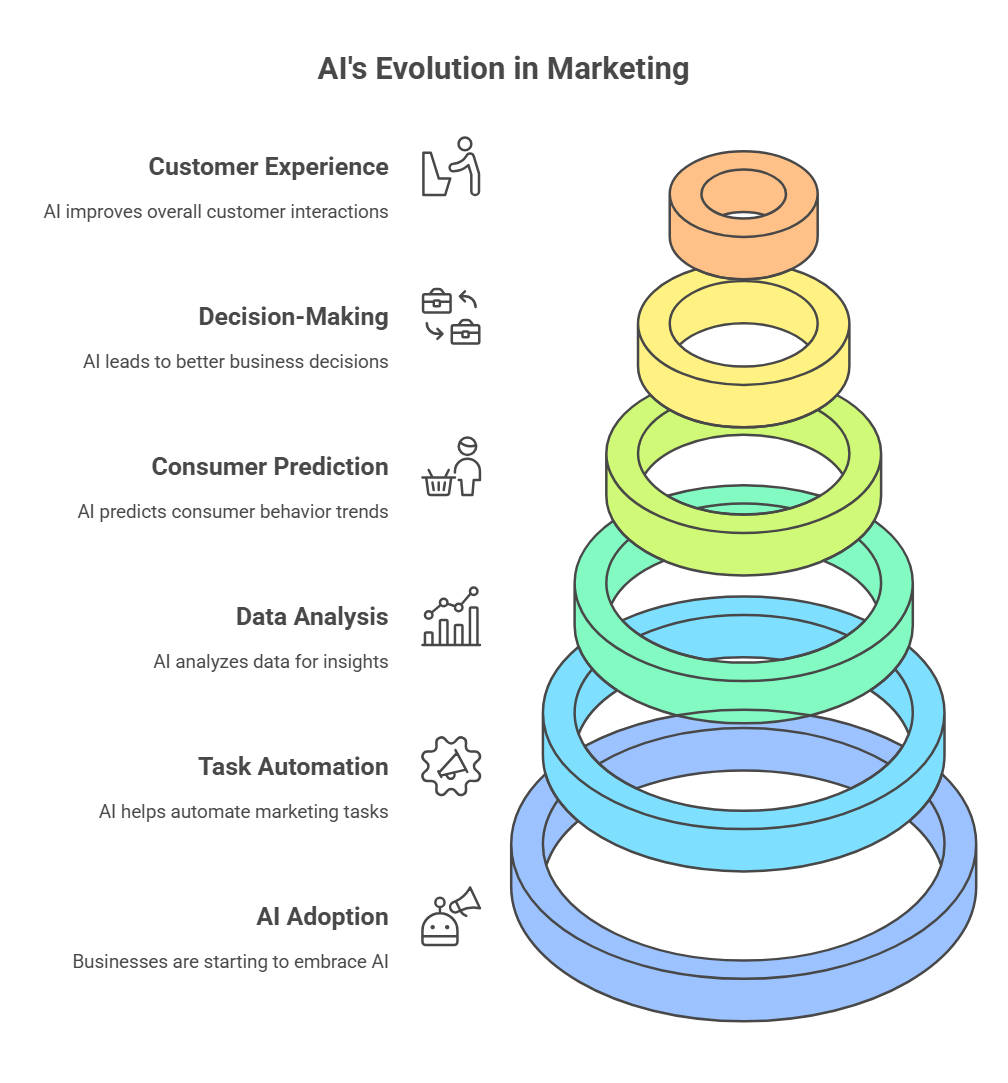Use AI in marketing automation by implementing tools for data analysis and personalized customer interactions. Automate repetitive tasks to increase efficiency and enhance engagement.
AI has revolutionized marketing automation by enabling businesses to streamline processes and enhance customer experiences. By leveraging AI-driven tools, marketers can analyze vast amounts of data swiftly, uncovering valuable insights about consumer behavior. This technology allows for personalized marketing strategies, tailoring messages to individual preferences and needs.

Automating tasks such as email campaigns, social media posting, and customer segmentation saves time and reduces human error. As companies adopt AI, they can focus on strategic initiatives while improving customer interactions. Embracing AI not only boosts productivity but also drives more effective marketing outcomes, ensuring brands stay competitive in a rapidly evolving landscape. This blog will provide a deep dive into AI in marketing automation, featuring research-backed insights and actionable tips to help businesses maximize their ROI.
Table of Contents
ToggleThe Rise Of Ai In Marketing
The world of marketing is changing rapidly. Artificial Intelligence (AI) plays a crucial role in this shift. Marketers now use AI to understand customer behavior better. This technology helps create personalized experiences. It boosts engagement and increases sales. Let’s explore how AI transforms marketing strategies and drives automation.
Ai: Transforming Marketing Strategies
AI is reshaping how marketers connect with their audience. Here are some key areas where AI makes an impact:
- Data Analysis: AI analyzes vast amounts of data quickly.
- Customer Insights: AI helps identify customer preferences and trends.
- Personalization: AI tailors marketing messages to individual users.
- Predictive Analytics: AI predicts future buying behaviors.
These transformations lead to better marketing strategies. Marketers can now create targeted campaigns. They can reach the right customers at the right time.
Marketing Automation: A Game-changer
Marketing automation powered by AI brings several advantages:
| Feature | Benefit |
|---|---|
| Automated Campaigns | Saves time and reduces manual work. |
| Lead Scoring | Identifies high-quality leads faster. |
| Performance Tracking | Measures campaign success in real-time. |
These features enhance efficiency and effectiveness. Businesses can focus on creative strategies. AI automates repetitive tasks, freeing up valuable time.
Integrating AI into marketing automation is essential for modern businesses. It leads to smarter decisions and better ROI. Companies that embrace this technology will stay ahead.

Identifying Your Marketing Goals
Identifying your marketing goals is essential for effective AI integration. Clear goals guide your strategy. They ensure your AI tools work toward specific outcomes.
Defining Success Metrics
Success metrics help measure your marketing performance. They provide insight into what works.
- Conversion Rate: Percentage of visitors who take action.
- Customer Acquisition Cost: Total cost to acquire a new customer.
- Return on Investment (ROI): Profit generated from marketing efforts.
- Engagement Rates: Interaction levels on social media and emails.
Choose metrics that align with your goals. For example, focus on conversion rates for sales-oriented campaigns. Use tools to track these metrics efficiently.
Aligning Ai With Business Objectives
Aligning AI with your business objectives is crucial. Define clear objectives first.
| Business Objective | AI Application |
|---|---|
| Increase Sales | Use AI for personalized recommendations. |
| Enhance Customer Service | Implement chatbots for quick responses. |
| Improve Marketing Efficiency | Automate email campaigns with AI. |
| Boost Brand Awareness | Utilize AI for social media insights. |
Aligning AI applications with these objectives creates synergy. Evaluate AI tools regularly. Ensure they meet your marketing goals.
Choosing The Right Ai Tools
Finding the best AI tools for marketing automation is crucial. The right tools can streamline tasks and enhance productivity. This section covers how to assess AI solutions and ensure they integrate well with your existing systems.
Assessing Available Ai Solutions
Start by evaluating the features of different AI tools. Here are some key factors to consider:
- Functionality: Does it meet your marketing needs?
- User Interface: Is it easy to use?
- Scalability: Can it grow with your business?
- Support: Is customer support available?
Use the following table to compare popular AI tools:
| Tool Name | Functionality | User Rating |
|---|---|---|
| HubSpot | CRM, Email Marketing | 4.5/5 |
| Mailchimp | Email Automation | 4.3/5 |
| Drift | Chatbots, Lead Generation | 4.6/5 |
Integration With Existing Systems
Choose AI tools that integrate smoothly with your current systems. This ensures efficient data flow and reduces manual tasks. Consider these steps:
- Check Compatibility: Ensure the AI tool works with your software.
- API Availability: Look for tools with API support.
- Data Migration: Confirm easy data transfer from old systems.
- Test Integrations: Run tests before full implementation.
Integration saves time and enhances overall marketing efforts. Make informed choices to improve your marketing automation journey.
Data: The Fuel For Ai Marketing
Data is essential for effective AI marketing. It powers algorithms, enhances targeting, and improves customer experiences. Quality data enables businesses to make informed decisions. It drives marketing automation, leading to better results.
Collecting Quality Data
Quality data collection is crucial for AI marketing. Here are some methods to gather effective data:
- Surveys: Ask customers about their preferences.
- Website Analytics: Track user behavior on your site.
- Social Media Insights: Analyze engagement metrics.
- Email Campaigns: Monitor open and click rates.
Use these tools to ensure the data you collect is accurate:
| Tool | Purpose |
|---|---|
| Google Analytics | Website traffic and behavior analysis |
| SurveyMonkey | Customer feedback collection |
| Hootsuite | Social media performance tracking |
| Mailchimp | Email campaign analytics |
Data Privacy And Ethical Considerations
Respecting data privacy is vital in AI marketing. Here are key points to consider:
- Informed Consent: Always ask for permission to collect data.
- Transparency: Explain how data will be used.
- Data Minimization: Collect only necessary data.
- Security Measures: Protect data from breaches.
Follow these practices to build trust with customers. Ethical marketing fosters long-term relationships. Respecting privacy can enhance brand reputation.
Personalization At Scale
Personalization at scale is key for effective marketing. It allows brands to deliver tailored experiences to many customers. Using AI makes this task easier and faster. AI analyzes data to understand customer preferences. This data helps create individual experiences that resonate.
Creating Individual Customer Experiences

Creating unique experiences for each customer boosts engagement. Here are some strategies:
- Data Collection: Gather data from various sources.
- Segmentation: Group customers based on behavior and preferences.
- Targeted Campaigns: Design campaigns for each segment.
AI can track customer behavior over time. It identifies patterns and predicts future actions. This helps in crafting messages that feel personal.
| Strategy | Description |
|---|---|
| Behavioral Analysis | Analyze how customers interact with your content. |
| Dynamic Content | Adjust content based on user preferences. |
| Feedback Loop | Use customer feedback to improve experiences. |
Leveraging Ai For Content Customization
AI tools can customize content in real-time. This capability enhances user experience significantly.
- Personalized Emails: Send emails based on user interactions.
- Product Recommendations: Suggest products based on browsing history.
- Chatbots: Provide instant answers tailored to user queries.
AI can analyze vast amounts of data quickly. It helps create content that appeals to different audiences. Using AI ensures that every customer feels valued.
- Implement AI tools for data analysis.
- Create segments based on insights.
- Customize content for each segment.
- Monitor results and adjust strategies.
Optimizing Customer Journeys
Optimizing customer journeys is vital for effective marketing automation. Understanding how customers interact with your brand enhances their experience. AI tools can streamline these processes, making them more efficient and engaging.
Predictive Analytics For Enhanced Engagement
Predictive analytics uses data to forecast customer behavior. This helps brands tailor their marketing strategies effectively.
- Identify trends: Analyze past behaviors to predict future actions.
- Segment audiences: Group customers based on similar traits.
- Personalize experiences: Deliver content that resonates with individual preferences.
Implementing predictive analytics can lead to:
| Benefit | Description |
|---|---|
| Higher Engagement | Targeted campaigns increase customer interest. |
| Increased Sales | More relevant offers boost conversion rates. |
| Better Retention | Understanding needs keeps customers coming back. |
Chatbots For Improved Customer Service
Chatbots enhance customer service by providing instant responses. They operate 24/7, ensuring help is always available.
- Answer FAQs: Provide quick answers to common questions.
- Gather feedback: Collect customer opinions for continuous improvement.
- Assist in purchases: Guide customers through the buying process.
Benefits of using chatbots include:
- Reduced response time
- Lower operational costs
- Increased customer satisfaction
Integrating chatbots into your strategy enhances customer journeys. They provide real-time support and valuable insights.
Ai-driven Advertising Campaigns
AI-driven advertising campaigns use technology to enhance marketing efforts. They automate processes, analyze data, and optimize ads. This leads to better targeting and higher conversions. Companies can reach their audience effectively with AI.
Programmatic Ad Buying
Programmatic ad buying automates the purchasing of online ads. It uses AI to analyze user data. This helps brands identify the right audience.
- Data Analysis: AI studies user behavior and preferences.
- Targeting: Ads reach specific demographics based on insights.
- Efficiency: Reduces time spent on manual ad buying.
Real-time Bidding Efficiency
Real-time bidding (RTB) allows marketers to bid on ad spaces in real-time. AI optimizes these bids to maximize budget use. It ensures that brands get the best ad placements.
| Benefit | Description |
|---|---|
| Speed | Bids happen in milliseconds, securing prime spots. |
| Cost Control | AI helps manage ad spend effectively. |
| Performance Tracking | Continuous monitoring improves future campaigns. |
Using AI in advertising enhances the overall effectiveness. Businesses see better engagement and increased sales. AI transforms how brands connect with their audience.
Evaluating Ai Performance
Evaluating AI performance is crucial for effective marketing automation. Knowing how well AI tools work helps businesses make better decisions. This section discusses measuring AI impact on KPIs and the importance of continuous learning.
Measuring Ai Impact On Kpis
Key Performance Indicators (KPIs) help track AI effectiveness. Here are some common KPIs to consider:
- Conversion Rate: Measures the percentage of visitors who complete a desired action.
- Customer Engagement: Tracks interactions such as clicks, shares, and comments.
- Return on Investment (ROI): Compares revenue generated against marketing costs.
- Lead Generation: Counts new leads acquired through AI-driven campaigns.
Use the following table to analyze AI performance based on these KPIs:
| KPI | Before AI | After AI | Change (%) |
|---|---|---|---|
| Conversion Rate | 2% | 5% | +150% |
| Customer Engagement | 100 | 250 | +150% |
| ROI | $1,000 | $2,500 | +150% |
| Lead Generation | 50 | 120 | +140% |
Continuous Learning And Adaptation
AI systems require ongoing learning to improve. They adapt to changing market trends and customer preferences. Here are steps to ensure continuous learning:
- Regular Data Updates: Keep input data fresh for accurate predictions.
- Feedback Loops: Use customer feedback to refine AI algorithms.
- Performance Reviews: Schedule regular reviews of AI performance against KPIs.
- Test New Strategies: Experiment with different approaches for better results.
Implementing these steps fosters a culture of improvement. This ensures your AI tools stay effective and relevant.
The Future Of Ai In Marketing
The future of AI in marketing is bright and full of potential. Businesses are starting to embrace AI to enhance their marketing strategies. AI helps automate tasks, analyze data, and predict consumer behavior. This leads to better decision-making and improved customer experiences.
As technology evolves, AI will play a crucial role in shaping marketing landscapes. Companies that adapt to these changes will thrive. They will reach customers more effectively and efficiently.
Emerging Trends To Watch
Several trends are reshaping the marketing world with AI:
- Personalization: Tailoring content to individual preferences.
- Predictive Analytics: Anticipating customer needs using data.
- Chatbots: Offering real-time customer support and engagement.
- Voice Search Optimization: Adapting content for voice queries.
- Content Generation: Automating content creation and curation.
Staying Ahead In A Competitive Landscape
To stay competitive, businesses must leverage AI effectively. Here are key strategies:
- Invest in AI Tools: Use advanced software for data analysis.
- Continuous Learning: Keep up with AI trends and updates.
- Customer Feedback: Gather insights to improve AI models.
- Test and Optimize: Regularly assess AI strategies for better results.
- Collaborate with Experts: Partner with AI specialists to enhance skills.
AI will redefine marketing strategies. Early adopters will gain a significant advantage. The key lies in understanding and implementing AI effectively.
Ensuring Ethical Ai Practices
Ethical AI practices are vital in marketing automation. They foster trust and responsibility. Businesses must prioritize transparency and consumer trust in AI usage.
Maintaining Transparency
Transparency in AI operations builds credibility. Customers deserve to know how their data is used. Clear guidelines and policies help in this regard.
- Inform users about data collection methods.
- Explain how AI algorithms work.
- Share the benefits of AI in marketing.
Consider these steps to enhance transparency:
- Publish an AI usage policy.
- Provide contact information for inquiries.
- Update users on any changes in processes.
Building Consumer Trust
Trust is crucial for customer loyalty. AI can enhance personalized experiences. However, it must respect user privacy.
Strategies to build consumer trust include:
- Secure user data with robust measures.
- Offer opt-out options for data sharing.
- Engage users with honest communication.
Trust can be measured through:
| Trust Metric | Description |
|---|---|
| Data Security | Users feel safe with their information. |
| Transparency | Clear information about AI processes. |
| User Control | Consumers can manage their data preferences. |
Ethical AI practices not only protect users but also enhance brand reputation. Building strong relationships with consumers leads to long-term success.
Case Studies: Success Stories And Lessons Learned
Exploring real-world examples reveals how AI in marketing automation transforms businesses. Success stories inspire growth, while failures teach valuable lessons. Let’s dive into these compelling case studies.
Analyzing Ai Successes In Marketing
Successful companies leverage AI for better marketing outcomes. Here are some standout examples:
| Company | Strategy | Result |
|---|---|---|
| Amazon | Personalized recommendations | Increased sales by 29% |
| Netflix | Content recommendations | Saved $1 billion on customer retention |
| Sephora | Chatbots for customer support | Boosted customer engagement by 50% |
These companies use AI tools effectively. They personalize experiences and automate tasks. This leads to higher customer satisfaction and increased profits.
Learning From Marketing Automation Failures
Not all AI marketing efforts succeed. Some campaigns fall short of expectations. Here are key lessons from notable failures:
- Target’s failed email campaign:
- Sent irrelevant offers.
- Resulted in high unsubscribe rates.
Other failures include:
- Microsoft’s Tay chatbot:
- Released with no proper filters.
- Promoted offensive content.
- IBM Watson’s healthcare project:
- Failed to understand complex medical data.
- Resulted in misinformation.
These failures highlight the importance of testing and refining AI strategies. Understanding customer needs is crucial. A solid approach can prevent missteps and promote success.

Frequently Asked Questions
How Can Ai Improve Marketing Automation?
AI enhances marketing automation by analyzing data to optimize campaigns. It can segment audiences more effectively, personalizing messages for better engagement. Additionally, AI automates repetitive tasks, freeing up time for creative strategies. With predictive analytics, businesses can anticipate customer behavior, leading to higher conversion rates.
What Are The Benefits Of Ai In Marketing?
The benefits of AI in marketing include increased efficiency, improved targeting, and enhanced customer experiences. AI tools can analyze vast datasets quickly, providing actionable insights. This leads to more personalized interactions and higher customer satisfaction. Ultimately, leveraging AI can drive better ROI on marketing efforts.
How Does Ai Personalize Marketing Efforts?
AI personalizes marketing by analyzing customer data and behavior. It identifies patterns that help tailor messages to individual preferences. This results in more relevant content and offers, increasing engagement. By understanding customer journeys, AI can create targeted campaigns that resonate with audiences, boosting conversion rates.
What Tools Use Ai For Marketing Automation?
Several tools utilize AI for marketing automation, including HubSpot, Marketo, and Salesforce. These platforms offer features like predictive analytics, lead scoring, and automated email campaigns. They enhance user experience by streamlining workflows and optimizing content delivery. Leveraging these tools can significantly improve marketing efficiency and effectiveness.
Conclusion
AI in marketing automation is not just a trend—it’s the future of digital marketing. By integrating AI-driven tools into your marketing strategy, you can enhance personalization, optimize campaigns, and significantly improve ROI. The key is to use AI intelligently, leveraging its capabilities to automate repetitive tasks while focusing on delivering meaningful and engaging customer experiences.
Whether you’re a small business or a large enterprise, AI-powered marketing automation can give you a competitive edge. Start implementing these strategies today and watch your marketing performance soar!
